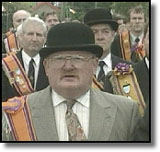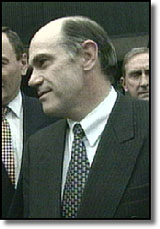
|
Compromise on Controversial Protestant March in BelfastLeaders of the Protestant Orange Order have agreed to route their controversial Belfast march on Saturday away from the predominantly nationalist Lower Ormeau Road.The Order's "serious decision" was made public through a statement given to reporter Martha Kearney of the BBC's Newsnight programme.
The statement said: "In view of the current unsetlled state of the province, and the very strong possible loss of life, the District Officers have related the following decision. On the twelfth day of July 1997, Ballynafeigh District will withdraw from the Belfast County Grand Lodge demonstration at Edenderry." But the Orange Order leaders insisted they had not given up their right to march whenever they wanted. "By taking this serious decision, we have not compromised our right to parade on either length of the Ormeau Road. We stand by the principle of not accepting an alternative route. This has been taken to avoid the enemies of Ulster, to cause loss of life and major civil disobedience," continued the statement. The announcement came on a day when politicians and security officials were locked away in meetings to try and avert further violence. In London, Tony Blair held discussions with Northern Ireland Secretary Mo Mowlam in a bid to map out the Government's strategy for this weekend. In Dublin, the Irish Prime Minister, Bertie Ahern, held talks with John Hume, the leader of the nationalist SDLP. Mr Hume has called for a moratorium on the marches. No details of their discussion were made available, but Mr Ahern said that they were "all designed to calm the current situation, and seek a compromise, dialogue and communication." In Belfast, RUC Chief Constable Ronnie Flanagan met with leading Orangemen at the Order's headquarters. He was accompanied by Lord Molyneaux, the former Ulster Unionist leader.
The Chief Constable was tight-lipped as he left the meeting. He said that it was "one of a series of ongoing meetings to discuss aspects of Saturday's parades." Several Orange marches are scheduled, including one in Londonderry, which will pass through the nationalist Bogside area, and one in Belfast, which will pass along the nationalist Lower Ormeau Road. "Everyone of any influence whatever should do all they can to urge restraint," Chief Constable Flanagan declared. "That is what people of influence should be doing from now right through to Saturday." One nationalist activist - Gerard Rice of the Lower Ormeau Concerned Community - said that counter-protests would be called off in the event of rerouting. In Londonderry, Unionist politicians and the Orange Order failed to turn up at a meeting called by mayor Martin Bradley. Seventy representatives from community groups, local businesses and the churches were in attendance.
Mr Bradley said: "There couldn't be a complete solution without those people being there. When we realised they weren't going to attend, we couldn't have an agreed solution." In Washington, meanwhile, a group of American Congressmen tabled a motion in Washington calling for a ban on marches along disputed parade routes in the province. Statements by the Congressmen amounted to some of the strongest American criticisms of Britain over the Irish question for many years. The Chairman of the international relations committee of the House of Representatives, Ben Gillman, said he was disgusted by the decision to allow contentious marches to proceed. Others, including Congressman Joseph Kennedy, the sponsor of the resolution, accused the Government of acting in bad faith, and of kow-towing to the Protestant majority."We do not believe these marches ought to continue," Mr Kennedy said. "Enough is enough. These marches do nothing to promote peace."
Dur. 2'57 The American criticisms came as it was announced that hundreds more troops were to be sent to Northern Ireland. Four hundred from the Stafford Regiment will arrive by the weekend, bringing the number of troops in the province to 17,500. |
Diana, Princess of Wales, 1961-1997
Conference 97
Devolution
The Archive
News |
Issues |
Background |
Parties |
Analysis |
TV/Radio/Web
Interactive |
Forum |
Live |
About This Site
News |
Issues |
Background |
Parties |
Analysis |
TV/Radio/Web
Interactive |
Forum |
Live |
About This Site
© BBC 1997 |
politics97@bbc.co.uk |


